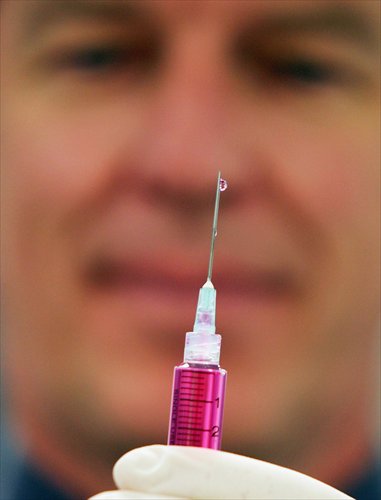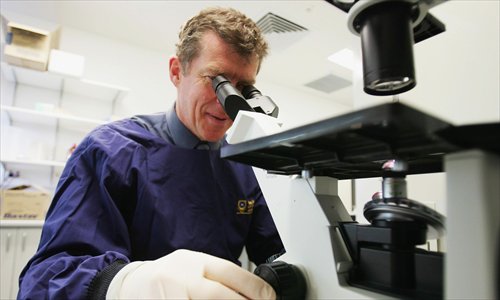HOME >> CHINA
Preventable deaths
By Fang Yang Source:Global Times Published: 2014-5-13 20:03:01


HPV vaccines are worked out by Australian medical professionals in 2005. Photos: CFP
Around 30,000 women die in China every year of cervical cancer. The country is estimated to have 130,000 new cervical-cancer cases each year, accounting for 28 percent of the global total. But the vaccines that could prevent tens of thousands of new cases a year are still not available on the mainland.Unlike most cancers, cervical cancer is chiefly caused by "high-risk" varieties of the human papilloma virus (HPV), which are sexually transmitted.
In the US, where HPV vaccinations are available but often fought against by religious or right-wing groups, the US Center for Disease Control and Prevention estimates that if 80 percent of teens received the recommended three doses of the vaccine, an estimated 53,000 additional cases of cervical cancer could be avoided over the lifetimes of girls aged 12 and above in the US alone.
Two popular HPV vaccines, Gardasil and Cervarix, are being used in more than 100 countries and regions but are not yet available in China, save for Hong Kong. This has stirred anger from many Chinese women who are still waiting for the vaccines to come into the Chinese market, despite being introduced eight years ago globally.
However, vaccines by the two multinational pharmaceutical companies UK-based Glaxo Smith Kline (GSK) Biologicals and US-based Merck, which have been applying for China's national drug authority's approval for years, are still under the registration process.
"GSK's cervical cancer vaccine Cervarix is currently undergoing regulatory review in China, and it is not currently approved for use in China," Jessie Lu from GSK China Communications told the Global Times.
Since its launch in 2007, Cervarix has become available in 130 countries around the world. To date, over 41 million doses of Cervarix have been distributed, Lu added.
Although clinical trials of the two vaccines in Chinese mainland has concluded, there is still no timeline for them to be put into market, Southern Weekly reported on Thursday, adding that the sample data of the two companies is not enough to meet China's evaluation standard.
Calls for vaccines
"China has to act to curb cervical cancers, which in fact can be prevented, treated, cured and even eliminated," Lang Jinghe, a member of the Chinese Academy of Engineering and a gynecologist at Peking Union Medical College Hospital in Beijing, said at a national cervical cancer coordination conference in April.
A seven-year delay of HPV vaccine inoculation from 2006 to 2012 could cause 59 million girls from 9 to 15 years old to miss the best window for inoculation, according to an article published in the medical magazine Vaccine by Wang Shaoming, a doctor from Chinese Academy of Medical Sciences & Peking Union Medical College.
"If those girls don't go through any intervention measures in the future, there will be 380,000 new cervical-cancer cases and 210,000 deaths among them," Wang said.
Media reports showed that an increasing number of Chinese women have chosen to go to Hong Kong for the HPV vaccine shots in recent years. "It takes three shots separately and about HK$1000 ($129) each time," news portal hangzhou.com.cn quoted a local woman surnamed Hong as saying.
Hong got the shots in Hong Kong in February, and spent a total of 13,000 yuan.
"The HPV vaccines have been proven safe and effective by years of practice worldwide, I don't see why the mainland still has to review them for so long," said Gong Xiaoming, a gynecologist with a Shanghai-based hospital. Gong said that if the vaccines have passed the US' Food and Drug Administration (FDA) approval, China should introduce them like other countries which recognized the FDA standard and save time and resources for additional trials.
Some Chinese doctors and officials claim that there are ethnic differences between Chinese people and Americans or Europeans, and clinical trials that target Chinese people are needed to ensure of the vaccines' safety and efficiency on Chinese.
But there is little evidence of such differences affecting vaccinations, especially with China's highly genetically diverse population. Hongkongers and people of Chinese descent in other countries have already received the vaccines without problem.
Controversial standards
Meanwhile, Liu Peng, a deputy professor in the School of Public Administration and Policy with Renmin University of China, said that as high-risk drugs, vaccines should be reviewed stricter before being applied domestically.
"China has a large population, and even low possibility adverse events could affect a large group of people," Liu told the Southern Weekly.
Shi Hui, who works in the pharmaceutical Industry, also said that China's Food and Drug Administration (CFDA) always takes new vaccines more seriously than other new medicines.
The CFDA's caution may be in part due to public panics after previous scandals involving allegedly sub-standard or out-of-date vaccines being issued, such as in Shanxi between 2006 and 2010, where vaccine storage was allegedly subcontracted to a private entrepreneur with local government connections and improper storage caused several deaths. The then Ministry of Health has denied the reports.
Besides GSK and Merck, another homegrown vaccine developed by experts from Xiamen University has also finished its first two phases of clinical trials and is undergoing the last phase.
Approval for those vaccines in China would bring huge benefits for these companies, Shi believed.
His opinion was echoed by Chen Hao, at the Huazhong University of Science & Technology, who said that protecting the domestic vaccine industry might be another reason for the delay.
The HPV vaccine made by Merck had a sales figure of $1.831 billion globally in 2013, according to Southern Weekly.
Although many believed that the CFDA's standards on vaccines approval are far too strict, Shi said that they won't be easily modified. "If anything goes wrong in the future, the authorities would have to pay the costs for making the change," he said.
CFDA's endpoint criteria for the trials requires a statistical differences in quantity, which requires a certain number of cancers occurring in the research group.
However, since it usually takes a decade for the infection to progress to invasive cancer, most other countries have applied a different criteria, which requires only a consistent infection showing up in the research group. A recent WHO report approved this method.
Current data would be enough if a new endpoint was adopted, Qiao Youlin from Chinese Academy of Medical Sciences & Peking Union Medical College told Southern Weekly.
Newspaper headline: HPV vaccine still unavailable in China 8 years on
Posted in: Society